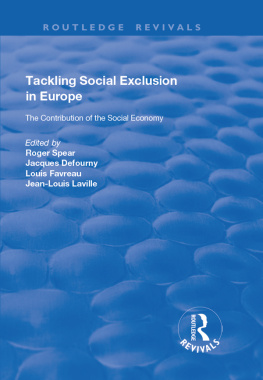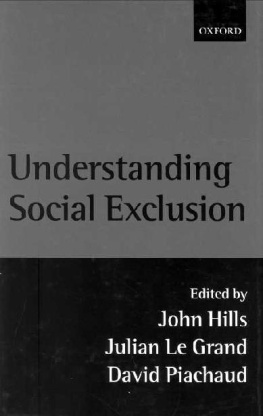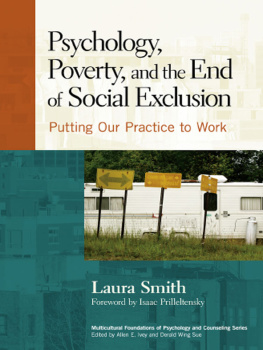Robert Strathdee - Social Exclusion and the Remaking of Social Networks
Here you can read online Robert Strathdee - Social Exclusion and the Remaking of Social Networks full text of the book (entire story) in english for free. Download pdf and epub, get meaning, cover and reviews about this ebook. year: 2017, publisher: Routledge, genre: Politics. Description of the work, (preface) as well as reviews are available. Best literature library LitArk.com created for fans of good reading and offers a wide selection of genres:
Romance novel
Science fiction
Adventure
Detective
Science
History
Home and family
Prose
Art
Politics
Computer
Non-fiction
Religion
Business
Children
Humor
Choose a favorite category and find really read worthwhile books. Enjoy immersion in the world of imagination, feel the emotions of the characters or learn something new for yourself, make an fascinating discovery.

- Book:Social Exclusion and the Remaking of Social Networks
- Author:
- Publisher:Routledge
- Genre:
- Year:2017
- Rating:4 / 5
- Favourites:Add to favourites
- Your mark:
- 80
- 1
- 2
- 3
- 4
- 5
Social Exclusion and the Remaking of Social Networks: summary, description and annotation
We offer to read an annotation, description, summary or preface (depends on what the author of the book "Social Exclusion and the Remaking of Social Networks" wrote himself). If you haven't found the necessary information about the book — write in the comments, we will try to find it.
Social Exclusion and the Remaking of Social Networks — read online for free the complete book (whole text) full work
Below is the text of the book, divided by pages. System saving the place of the last page read, allows you to conveniently read the book "Social Exclusion and the Remaking of Social Networks" online for free, without having to search again every time where you left off. Put a bookmark, and you can go to the page where you finished reading at any time.
Font size:
Interval:
Bookmark:

OF SOCIAL NETWORKS
2 Park Square, Milton Park, Abingdon, Oxon OX14 4RN
711 Third Avenue, New York, NY 10017, USA
Product or corporate names may be trademarks or registered trademarks, and are used only for identification and explanation without intent to infringe.
Strathdee, Robert
Social exclusion and the remaking of social networks.
(Voices in development management)
1. Youth - Employment 2.Youth - Employment - Government
policy 3.Youth - Social networks
I. Title
331.34137
Strathdee, Robert.
Social exclusion and the remaking of social networks / Robert Strathdee.
p. cm. (Voices in development management)
Includes bibliographical references and index.
YouthSocial networks. 4. Vocational education. 5. Labor market. 6. Social capital (Sociology) I. Title. II. Series: University of North London voices in development
management.
362.7083--dc22
CBET | Competency-based education and training |
E2E | Entry to Employment |
ITO | Industry Training Organisation |
MAS | Modern Apprenticeship Scheme |
NCEA | New Zealand Certificate in Educational Achievement |
NEET | Not in Employment, Education or Training |
NPM | New Public Management |
NQF | National Qualifications Framework |
NZQA | New Zealand Qualifications Authority |
PA | Personal Advisor |
PTE | Private Training Establishment |
TEC | Tertiary Education Commission |
TO | Training Opportunities |
VET | Vocational Education and Training |
WINZ | Work and Income New Zealand |
YT | Youth Training |
Introduction
Font size:
Interval:
Bookmark:
Similar books «Social Exclusion and the Remaking of Social Networks»
Look at similar books to Social Exclusion and the Remaking of Social Networks. We have selected literature similar in name and meaning in the hope of providing readers with more options to find new, interesting, not yet read works.
Discussion, reviews of the book Social Exclusion and the Remaking of Social Networks and just readers' own opinions. Leave your comments, write what you think about the work, its meaning or the main characters. Specify what exactly you liked and what you didn't like, and why you think so.







